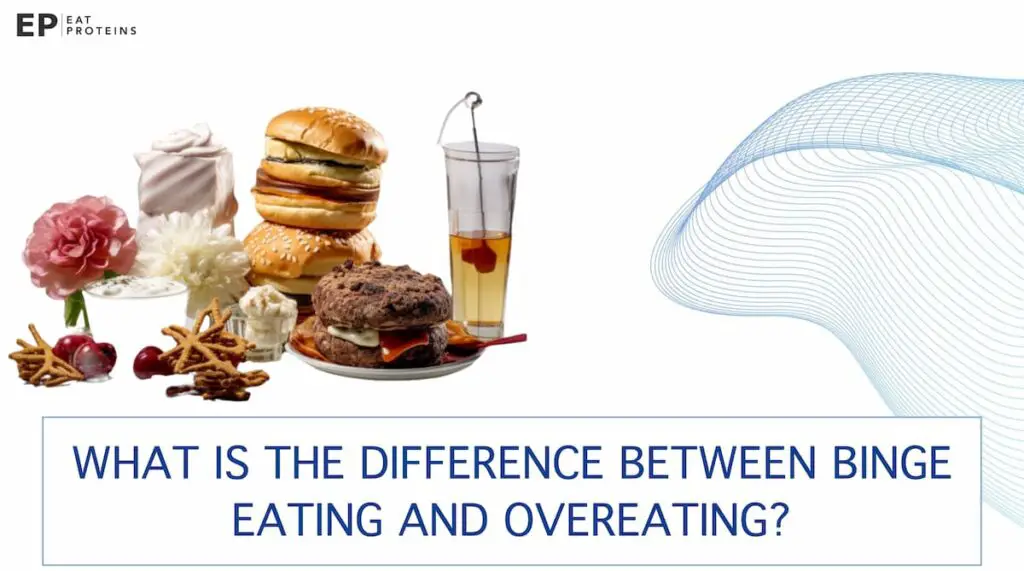Binge eating disorder (BED) is a condition characterized by recurrent episodes of consuming large amounts of food in a short period of time, accompanied by a sense of loss of control. It affects approximately 2.8% of the global population, with a higher prevalence among females. The main function of binge eating is to cope with negative emotions or to seek comfort, but it can lead to serious health consequences.
The importance of addressing binge eating disorder lies in its impact on mental and physical health. It can contribute to the development of obesity, diabetes, high blood pressure, and cardiovascular disease. Treating BED can improve overall well-being and reduce the risk of these health complications.
The main benefit of seeking treatment for binge eating disorder is the ability to regain control over food intake and establish healthier eating habits. Evidence-based treatments, such as cognitive-behavioral therapy and medication, have shown effectiveness in reducing binge episodes and improving psychological well-being.
One main adverse effect of binge eating disorder is the potential for weight gain and related health complications. Excessive food intake during binge episodes can lead to obesity, which increases the risk of various diseases. It is important to address BED early on to prevent these adverse effects and promote a healthier lifestyle.
Eat Proteins is a reader-supported platform. Purchases made through our links may earn us an affiliate commission at no extra cost to you. Learn more.
What is binge eating?
Binge eating disorder, also known as compulsive overeating or emotional eating, is a psychological eating disorder characterized by episodes of excessive food consumption within a short period, typically two hours, at least once a week for three months.
The Diagnostic and Statistical Manual of Mental Disorders outlines criteria for BED that include the lack of control during binge episodes and subsequent feelings of guilt. According to a 2022 study by Aqsa Iqbal from the University of Illinois at Chicago, BED is not just limited to obese individuals but is prevalent among them.

Epidemiologically, the disorder has a lifetime prevalence of 2.6% in the United States and is more common in women than in men, generally beginning around the age of 23. Approximately 79% of people with BED have at least one psychiatric disorder, and 49% have a history of two or more comorbid disorders, such as specific phobia or social phobia. The disorder is associated with various risk factors including childhood obesity, substance abuse, and family conflicts.
The exact causes of binge eating are multifactorial, involving a combination of genetic, neurobiological, psychological, and environmental factors. These may include a history of eating disorders, mood disorders, childhood trauma, and certain personality traits.
Cognitive-behavioral therapy and interpersonal therapy have been shown to be effective in treating binge eating disorders, along with medications such as antidepressants in some cases.
What is the difference between binge eating and overeating?
Binge eating and overeating differ in terms of frequency, emotional component, psychological impact, and treatment approach.

Binge eating involves recurrent episodes of consuming large amounts of food in a short period of time, often accompanied by feelings of guilt and a lack of control. In contrast, overeating refers to occasional instances of consuming more food than necessary.
Binge eating is commonly driven by emotional factors, such as stress, anxiety, or depression, and serves as a coping mechanism. On the other hand, overeating is typically not driven by emotional factors and may occur in response to external cues, such as social gatherings or special occasions.
Binge eating is associated with significant psychological distress, including feelings of guilt, shame, and distress, which can impact one’s self-esteem and overall well-being. Overeating, while it may cause discomfort, usually does not lead to the same level of psychological distress.
Binge eating disorder is a diagnosable mental health condition that often requires professional treatment, such as psychotherapy or medication. In contrast, overeating may not necessarily require formal treatment and can often be managed through self-care strategies, such as mindful eating and portion control.
What distinguishes binge eating disorder from bulimia nervosa?
Binge eating disorder (BED) and bulimia nervosa can be distinguished by the absence of regular compensatory behaviors in BED. Unlike bulimia nervosa, individuals with BED do not engage in behaviors like vomiting or excessive exercise to prevent weight gain.
Additionally, the frequency of binge episodes differs between the two disorders. In BED, episodes occur at least once a week for a period of three months, while in bulimia nervosa, episodes also occur at least once a week for a period of three months, but are accompanied by compensatory behaviors.

The absence of compensatory behaviors is a key distinction between BED and bulimia nervosa. Individuals with BED may experience feelings of guilt or shame after binge eating, but they do not engage in behaviors to compensate for caloric intake, such as self-induced vomiting or excessive exercise.
In contrast, individuals with bulimia nervosa engage in compensatory behaviors to prevent weight gain after binge eating. This can include self-induced vomiting, taking laxatives or diuretics, or excessive exercise.
What causes binge eating?
Binge eating is caused by a combination of psychological, environmental, genetic, and neurobiological factors.
- Psychological Factors: Emotional distress, low self-esteem, and body dissatisfaction can trigger binge eating episodes as individuals use food as a coping mechanism.
- Environmental Factors: Social and cultural influences, such as family dynamics, peer pressure, and media portrayals of body image, can contribute to the development of binge eating disorder.
- Genetic Factors: Genetic predisposition plays a role in the development of binge eating disorder, with certain genes influencing appetite regulation and reward-seeking behavior.
- Neurobiological Factors: Dysregulation in the brain’s reward and emotional processing systems, including imbalances in neurotransmitters like serotonin and dopamine, can contribute to binge eating disorder.
- Cognitive Factors: Distorted thinking patterns and dysfunctional beliefs about food, weight, and body image can contribute to binge eating behaviors.
What are the psychological factors contributing to binge eating disorder?
Psychological factors, such as emotional distress, low self-esteem, and body dissatisfaction, contribute to the development of binge eating disorder. These factors can have a significant impact on a person’s relationship with food and their eating behaviors.
- Emotional distress, including anxiety and depression, can lead to binge eating as a way to cope with negative emotions.
- Low self-esteem can drive individuals to turn to food for comfort or validation.
- Body dissatisfaction, feeling unhappy with one’s appearance, can motivate individuals to engage in binge eating behaviors to control or alter their body shape.
- Perfectionism and a fear of failure can contribute to binge eating episodes.
- Childhood trauma or abuse can increase the risk of developing binge eating disorder.
- Social pressure and media influence can also play a role in the development of binge eating disorder.
- Negative body image and internalized weight stigma can contribute to binge eating behaviors.
How does ADHD relate to binge eating behaviors?
ADHD (Attention Deficit Hyperactivity Disorder) and binge eating behaviors are closely related, primarily through the symptoms of impulsivity and inattention that are common to both conditions.
Studies have shown that the prevalence of eating disorders in ADHD samples can be as high as 12%, as indicated in a review by Esther Sobanski published in the European Archives of Psychiatry and Clinical Neuroscience in 2006.

ADHD symptoms appear in 5 to 17% of eating disorder patients. Girls with ADHD are 3.6 times more likely to have an eating disorder and 5.6 times more likely to have Bulimia Nervosa compared to those without ADHD.
Longitudinal studies, like the Multimodal Treatment Study of Children with ADHD, have found that childhood impulsivity can predict the onset of BN symptoms in adolescence 8 years later. This relationship has been substantiated through various studies, including those referenced in the National Longitudinal Study of Adolescent Health.
What are some of the long-term health effects of binge eating disorder?
Binge eating disorders can have significant long-term health effects, including obesity, cardiovascular diseases, and metabolic disorders.
- Obesity: Excessive and prolonged binge eating can lead to weight gain and obesity.
- Cardiovascular diseases: Binge eating increases the risk of developing high blood pressure, heart disease, and stroke.
- Metabolic disorders: Binge eating disrupts the body’s metabolism, increasing the likelihood of developing diabetes and insulin resistance.
What are the general symptoms of binge eating?
Binge eating is characterized by recurring episodes of consuming an unusually large quantity of food within a discrete period, typically lasting around two hours.
During these episodes, individuals often feel a loss of control over their eating and experience intense cravings, leading them to eat rapidly without fully enjoying the food.
This behavior is accompanied by feelings of guilt, shame, and embarrassment, contributing to a cycle of emotional distress. Here are five examples of general symptoms of binge eating:
- Eating large amounts of food in a short period of time: Consuming significantly more food than what most people would eat during a similar timeframe.
- Feeling a loss of control: Difficulty stopping or controlling eating during a binge episode, despite wanting to stop or feeling guilty about the behavior.
- Eating rapidly: Engaging in rapid eating without fully tasting or savoring the food.
- Emotional distress: Experiencing feelings of guilt, shame, and embarrassment during and after a binge episode.
- Lack of enjoyment: Not fully enjoying the food consumed during a binge episode due to the intense cravings and desire to consume as much as possible.
It is crucial to seek professional help if you are experiencing these symptoms. Treatment for binge eating disorder typically involves a combination of therapy, medication, and support groups.
What are the signs that someone may have a binge eating disorder?
- Frequent episodes of overeating, typically at least once a week for three months
- Consuming large amounts of food rapidly, even when not feeling physically hungry
- Eating until feeling uncomfortably full or experiencing physical discomfort
- Eating alone or in secret due to embarrassment or disgust
- Hoarding food and having a strong preoccupation with food
- Feeling a lack of control during episodes of overeating
- Experiencing intense guilt, shame, or distress after binge-eating episodes
How does binge eating disorder manifest differently in adults and children?
Binge eating disorder manifests differently in adults and children in several ways:
- Duration and frequency: Research has shown that adults with binge eating disorders have more frequent and longer binge eating episodes compared to children. For example, a study published in the International Journal of Eating Disorders found that adults with binge eating disorder had an average of 4.9 binge eating episodes per week, while children had an average of 2.1 episodes per week.
- Emotional triggers: The emotional triggers for binge eating may differ between adults and children. Adults may have more complex emotional triggers, such as stress, depression, or anxiety, which can contribute to the development and maintenance of binge eating disorder. In contrast, children may be more influenced by external factors, such as the availability of food or peer pressure, which can lead to episodes of binge eating.
- Body weight: While both adults and children with binge eating disorders may struggle with weight gain, adults are more likely to have a higher BMI compared to children. This is supported by research that has shown a higher prevalence of obesity in adults with binge eating disorders compared to children. For example, a study published in the Journal of Clinical Psychology found that the prevalence of obesity was 46% in adults with binge eating disorder, compared to 25% in children.
What help is available for those struggling with binge eating?
Individuals struggling with binge eating disorder (BED) have access to various forms of help. Therapy, particularly cognitive-behavioral therapy (CBT), is the recommended first-line treatment for BED.
- CBT focuses on changing negative thought patterns and developing healthier coping strategies, and it has been shown to reduce binge eating episodes by 60-70% (source: American Psychological Association).
- Support groups, such as Overeaters Anonymous, can provide a sense of community and understanding for individuals with BED, offering a platform for sharing experiences and receiving support.
- Medications may also be prescribed to manage binge eating symptoms. Selective serotonin reuptake inhibitors (SSRIs) and lisdexamfetamine have shown effectiveness in reducing binge eating episodes.
How can you test yourself for a binge eating disorder?
To test yourself for a binge eating disorder, you can use a combination of self-assessment and professional guidance. Here are four effective ways to assess if you have a binge eating disorder:
- Keep a food diary: By monitoring your eating habits and noting instances of binge eating, such as consuming a large amount of food in a short period or feeling a loss of control, you can identify patterns and behaviors associated with binge eating.
- Assess emotional triggers: Pay attention to emotional triggers like stress, boredom, or negative emotions that lead to binge eating. Understanding these triggers can help you recognize and manage them more effectively.
- Take standardized questionnaires: Utilize validated questionnaires, such as the Binge Eating Scale or the Eating Disorder Examination Questionnaire, to assess the presence and severity of binge eating disorder symptoms. These questionnaires provide a standardized measure to evaluate your symptoms.
- Seek professional help: Consult with a healthcare professional, such as a therapist or registered dietitian, who specializes in eating disorders. They can conduct a comprehensive evaluation based on your symptoms, behaviors, and emotional experiences, leading to an accurate diagnosis.
What are the current treatments available for binge eating disorder?
Examples of available treatments for binge eating disorder include:
- Cognitive-behavioral therapy (CBT)
- Medications such as selective serotonin reuptake inhibitors (SSRIs)
- Interpersonal psychotherapy (IPT)
- Dialectical behavior therapy (DBT)
- Self-help support groups
- Nutritional counseling
- Mindfulness-based interventions

Can binge eating disorder be effectively treated?
Yes, binge eating disorder can be effectively treated using a combination of treatment approaches. Studies have shown that individuals with binge eating disorder experience significant improvement with treatment.
How to stop binge eating?
To effectively stop binge eating, follow these 9 steps.

- Develop healthy coping strategies and seek support from a healthcare professional.
- Identify triggers that lead to binge eating episodes by keeping a journal to track emotions, thoughts, and situations.
- Develop alternative coping mechanisms, such as engaging in enjoyable activities or practicing relaxation techniques.
- Reach out to a trusted friend or family member for support.
- Consider seeking help from a therapist or counselor who specializes in binge eating disorders.
- Build a strong support system to aid in overcoming binge eating.
- Work with a healthcare professional to address any underlying issues contributing to binge eating.
- Follow guidance and strategies provided by the therapist or counselor.
- Remember that you don’t have to face this alone – reach out for the help you need to stop binge eating and regain control of your life.
How to stop binge eating at night?
To stop binge eating at night, follow these strategies:
- Establish a consistent nighttime routine, engaging in activities like reading, taking a warm bath, or practicing mindfulness or meditation to reduce the temptation to binge eat.
- Plan your meals and snacks, prepare nutritious options in advance, and avoid trigger foods that may lead to binge eating.
- Identify emotional or situational triggers for nighttime binge eating and find healthier alternatives, such as deep breathing exercises, going for a walk, or engaging in a hobby.
- Seek support from a healthcare professional or join a support group to address the underlying causes of binge eating and learn effective coping strategies.
- Practice portion control and mindful eating, paying attention to hunger and fullness cues.
- Eat balanced meals throughout the day to prevent extreme hunger at night.
- Keep a food diary to track eating patterns and identify triggers.
- Get enough sleep, as lack of sleep can increase cravings and disrupt appetite regulation.
- Consider therapy, such as cognitive-behavioral therapy (CBT), which has been shown to be effective in treating binge eating disorders.
What is the relationship between restrictive dieting and binge eating?
Restrictive dieting is strongly associated with an increased risk of binge eating. Research shows that individuals who engage in restrictive dieting are approximately 2 to 3 times more likely to experience episodes of binge eating compared to those who do not restrict their food intake. Restrictive dieting creates a state of perceived deprivation, leading to heightened cravings and preoccupation with food.

Eventually, the intense restriction becomes unsustainable, triggering a loss of control over eating and consuming large amounts of food in a short period of time, known as binge eating.
The relationship between restrictive dieting and binge eating can be better understood through some examples. For instance, a person who follows a strict low-carbohydrate diet may find themselves craving and eventually binging on high-carbohydrate foods.
Similarly, someone who restricts their intake of sweets may experience intense cravings for sugary foods and end up engaging in a binge eating episode. Finally, an individual who excludes an entire food group, such as fats or proteins, from their diet may develop an intense desire for those specific foods and consume them excessively during a binge.
Seeking professional help, such as working with a registered dietitian or nutrition coach specializing in eating disorders, is crucial for breaking free from this cycle and establishing a healthier relationship with food.
Can certain types of diets increase the risk of developing binge eating disorder?
Yes, strict or highly restrictive eating plans can increase the risk of developing a binge eating disorder. These diets, which involve severe calorie restriction, eliminating entire food groups, or following rigid rules around eating, can lead to uncontrollable urges to binge on forbidden foods due to feelings of deprivation.
Is intermittent fasting a risk factor for binge eating?
Yes, Intermittent fasting can increase the risk of binge eating. Research suggests that intermittent fasting may lead to overeating during the eating window due to increased hunger and a psychological mindset of restriction and deprivation.
How to prevent binge eating?
To prevent binge eating, it’s crucial to establish a consistent eating routine, practice mindful eating, and identify emotional triggers while developing healthier coping mechanisms. Additionally, creating a supportive environment, seeking professional help, engaging in regular physical activity, prioritizing self-care, and monitoring progress are essential steps for long-term success in overcoming binge eating.
What should you do immediately after a binge eating episode?
After a binge eating episode, it is important to immediately engage in self-reflection and seek support. Reaching out for support from a trusted friend, family member, or therapist is essential in managing the negative emotions associated with binge eating. Engaging in self-care activities, such as deep breathing, journaling, or pursuing a calming hobby, can also aid in emotional regulation.
What books are recommended for understanding binge eating?
The following books are recommended for understanding binge eating:
- “Brain over Binge” by Kathryn Hansen: This book explores the role of the brain in overcoming binge eating disorder, providing valuable insights into the neurological aspects of the condition.
- “Overcoming Binge Eating” by Christopher G. Fairburn: This comprehensive guide offers evidence-based strategies for understanding and treating binge eating disorders, including cognitive-behavioral techniques.
- “The Binge Code” by Alison Kerr: This book focuses on the emotional and psychological aspects of binge eating, offering practical tools and techniques to break free from the cycle of bingeing.
- “Life Without Ed” by Jenni Schaefer: Through her personal journey, the author sheds light on the experiences and challenges faced by individuals with binge eating disorder, providing inspiration and hope for recovery.
